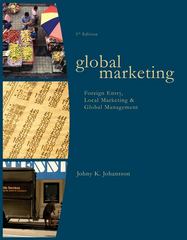Question
In [Adam] Smith's time, markets were largely local or at most national in scope, except in key commodities that were traded internationally (e.g. sugar, slaves
"In [Adam] Smith's time, markets were largely local or at most national in scope, except in key commodities that were traded internationally (e.g. sugar, slaves or spices) or a limited range of manufactured goods (e.g. silk, cotton and woollen clothes). These markets were served by numerous small-scale firms, resulting in the state that economists these days call perfect competition, in which no single seller can influence the price. For people from Smith's time, it would have been impossible even to imagine companies hiring over twice the then size of London's population (0.8 million in 1800) operating in territories that outnumber the then British colonial territories (around twenty) by a factor of six (McDonald's operates in over 120 countries)." (Ha-Joon Chang,Economics: The User's Guide, p.38)
Using examples, discuss how today's markets and firms are different from the ones in the 1800s.
Step by Step Solution
There are 3 Steps involved in it
Step: 1

Get Instant Access to Expert-Tailored Solutions
See step-by-step solutions with expert insights and AI powered tools for academic success
Step: 2

Step: 3

Ace Your Homework with AI
Get the answers you need in no time with our AI-driven, step-by-step assistance
Get Started


